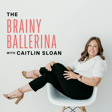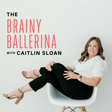
57. Longevity in Dance: Nancy Paradis Shares the Key to a Sustainable Dance Career
Join me today as I sit down with Nancy Paradis, a seasoned choreographer, artistic director, and educator with a rich career spanning classical ballet and the commercial dance world. She also leads LA Dance Moves, an innovative company blending dance, music, art and media to create inspiring works.
In this inspiring episode, Nancy takes us through her remarkable journey in the dance world - a path that began with just one ballet class a week and led to a professional career spanning over five decades.
She opens up about how her dance beginnings were anything but typical, and how she made the bold leap from limited training to dancing professionally. Nancy shares what it was like to leave home at a young age to pursue her passion, and her experience as one of the original members of the Richmond Ballet.
We dive into the moment she first stepped into a jazz class and how that experience opened her eyes to a new style, far removed from the rigid structure of classical ballet. Nancy also recalls her very first professional gig - a short 10-day contract that paid enough for her to buy her first car!
Balancing motherhood and a demanding dance career is a challenge many dancers face. Nancy talks candidly about when she felt secure enough in her career to take a step back and focus on her family, and how she managed to return and evolve as a performer, choreographer, and teacher.
She discusses the key differences between company life and commercial work, and shares valuable insights into what it takes to sustain a long-term career in the ever-changing world of dance.
With over 50 years of experience, Nancy offers heartfelt advice for aspiring dancers, reveals the kind of energy she strives to foster in her classes, and the lasting impact she hopes to have on her students. Plus, for anyone curious about what makes a dancer stand out to a director - Nancy lets us in on her secret. She even shares rarely discussed business tips that every dancer should hear.
Connect with Nancy:
YOUTUBE: Nancy Paradis (LA Dance Moves)
WEBSITE: ladancemoves.com
INSTAGRAM: @ladance_moves
Links and Resources:
Aloha Nutrition Bars: 20% off using code: BRAINYBALLERINA
Ballet Help Desk Website
Let’s connect!
My WEBSITE: thebrainyballerina.com
INSTAGRAM: instagram.com/thebrainyballerina
Questions/comments? Email me at caitlin@thebrainyballerina.com
This episode was brought to you by the Pivot Ball Change Network.

